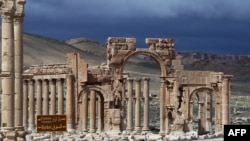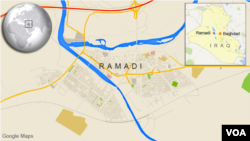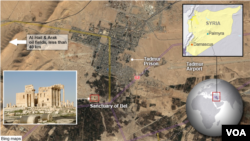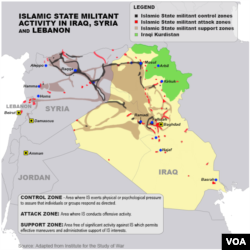Islamic State fighters are poised to seize one of the largest arms depots in Syria after taking control of the city of Palmyra, home to a UNESCO World Heritage Site that experts fear the extremists may loot and destroy as they have done with major archaeological sites in neighboring Iraq.
With Palmyra in their grasp, the Islamic State group has now scored two major strategic victories this month: Five days ago, the militants overran Ramadi, the capital of Iraq’s largest province, Anbar.
Days after saying Islamic State fighters were on the defensive across Iraq, the U.S. military tried to downplay Ramadi’s fall earlier this week, portraying it as a part of the ebb and flow of a “complex, bloody fight.”
U.S. President Barack Obama described the loss of Ramadi as a tactical setback, while insisting the war against the jihadist group is not being lost.
"I don't think we're losing," Obama said in an interview with news magazine The Atlantic, which appeared online Thursday. The interview took place just after Ramadi had fallen to Islamic State fighters.
"There’s no doubt there was a tactical setback, although Ramadi had been vulnerable for a very long time, primarily because these are not Iraqi security forces that we have trained or reinforced,” he said in The Atlantic interview.
When asked about the continuing role Iraq plays in American politics, Obama reframed the question to make the argument that Republicans still don’t grasp key lessons about the Iraq invasion ordered 12 years ago by former President George W. Bush.
"One lesson that I think is important to draw from what happened is that if the Iraqis themselves are not willing or capable to arrive at the political accommodations necessary to govern, if they are not willing to fight for the security of their country, we cannot do that for them," Obama said.
Archaeological treasure
In the international media, focus in the run-up to the jihadi capture of Palmyra has been on the likely fate of the city's 2,000-year-old ruins, one of the Middle East’s most complete Roman archaeological sites.
Ahead of the fall of the city – the modern part is known as Tadmur – hundreds of statues were moved to safe locations, but there remain irreplaceable treasures that could be destroyed or sold on the black market, Syrian and U.N. officials warned.
“I am terrified,” said Maamoun Abdulkarim, Syria’s director-general of antiquities and museums. “This is a PR battle for Daesh [ISIL] and they will insist on scoring a victory against civilization by destroying” the ancient ruins.
Abdulkarim also slammed the international community for failing to defend the site.
European Union foreign affairs chief Federica Mogherini said Islamic State "mass killings and deliberate destruction of archaeological and cultural heritage in Syria and Iraq amount to a war crime."
Palmyra is one of the world's most magnificent and well-preserved archaeological sites, Middle East historian David Lesch of Trinity University in San Antonio, Texas, told the VOA. "This is one of the few sites in the entire world, of the Roman era, where you can see the entire city planning. ... It's a huge loss to history, to archaeology."
There are so far no reports of any damage to the ruins.
Strategic blow for Syria
But while fears mount about the ancient ruins and artifacts, military analysts said the assault represents a serious strategic blow for the Syrian government. It marks the first time the Islamic State group, also known by the acronym ISIL, has seized from Syrian government forces a major city.
Previously, Islamic State's major military gains in Syria came at the expense of other insurgent groups, with the Islamist extremists grabbing towns other rebels had captured from the Syrian government.
Among the immediate prizes is one of Syria's biggest weapons depots as well as army bases, an airport, the significant gas fields of al-Hail and Arak and a notorious prison that has long been viewed as a symbol of state repression.
One Syrian soldier said Damascus' forces were overwhelmed at Palmyra
"The IS militants have tanks, mortars, missiles, and heavy machine guns," the soldier said. "Their weapons are advanced. They launched the attack from many directions, with each group consisting of a dozen to some 30 people."
Rami Abdelrahman, the head of the Syrian Observatory for Human Rights, a London-based monitoring group that relies on activists inside Syria for its information, said Thursday at least 100 pro-government fighters had been killed since Wednesday.
The Observatory also said with the latest westward advance, Islamic State militants now control more than half of Syrian territory.
WATCH: Related video of Islamic State fighters taking control of Palmyra, Syria
With the militants now in control of Palmyra, Homs and Damascus, the Syrian capital, are now exposed to an attack by the extremists, military analysts said. But more immediately, the offensive will allow the group to consolidate its hold on the eastern province of Deir ez Zour, where embattled regime forces rely on land resupply via a major highway running from Damascus through Palmyra.
Islamic State fighters can now sever that road, forcing the government to air-lift supplies to garrisons it controls in Deir ez Zour.
The speed with which Assad’s forces collapsed defending a strategically important city with good supply lines from Damascus raises questions about the regime’s military capability after four years of civil war.
Palmyra is the second big loss in recent weeks the government has sustained. In April, a new Islamist alliance of rebel brigades backed by al-Qaida affiliate Jabhat al Nusra captured Idlib in northern Syria, only the second provincial capital the regime has lost in the conflict so far.
Loss in Iraq
The loss of Ramadi handed Baghdad its most significant setback in a year and exposed the limitations of both the Iraqi army and a campaign of U.S.-led airstrikes designed to "degrade and destroy" the Islamic State group.
Kurdish Service Kirkuk-based reporter Dilshad Anwar told VOA a large number of Anbar's displaced residents is heading toward Diyala province and to the city of Khanaqin. However, Anwar said Kurdish authorities have not allowed displaced Anbar residents to enter their region.
A number of Arab families have also settled in mosques and villages between Jalawla, Garmiyan and Khanaqin, he added.
According to the International Organization for Migration, 900,000 Anbaris have been forced from their homes since January 2014.
The United States plans to deliver 1,000 anti-tank weapons to Iraq in June to combat suicide bombings like those that helped the Islamist group grab Ramadi, a senior U.S. State Department official said on Thursday.
Possible operation to retake Ramadi
The militants in Ramadi are seeking to consolidate their gains in the surrounding province of Anbar by pushing east toward the Habbaniya base where Iraq Prime Minister Haider al-Abadi has had Iraqi security forces and Shi'ite militias mass for a possible military operation to retake the city.
Daniel Serwer, senior analyst at the Middle East Institute who is a former U.S. diplomat, said there are some missing pieces in the overall approach by the U.S. and Iraq to countering the Islamic State group.
"The real missing piece is the ground force that can take hold of the territory and the civilian capacity to rebuild once it’s done," Serwer said.
He said to turn the tide on the Islamist militants in the long run, the support of the Sunni population is very important.
"You will not have a real win in the war unless you rebuild on the territories that’s retaken militarily and that requires the support of the Sunni population," he said. "Using Shi'ite militia against a Sunni outfit is a mistake, but this is a mistake the Abadi government has to make because Iraq has not developed any alternative to that."
VOA's Deewa and Kurdish services, and Victor Beattie, contributed to this report. Some material for this report came from Reuters and AFP.









